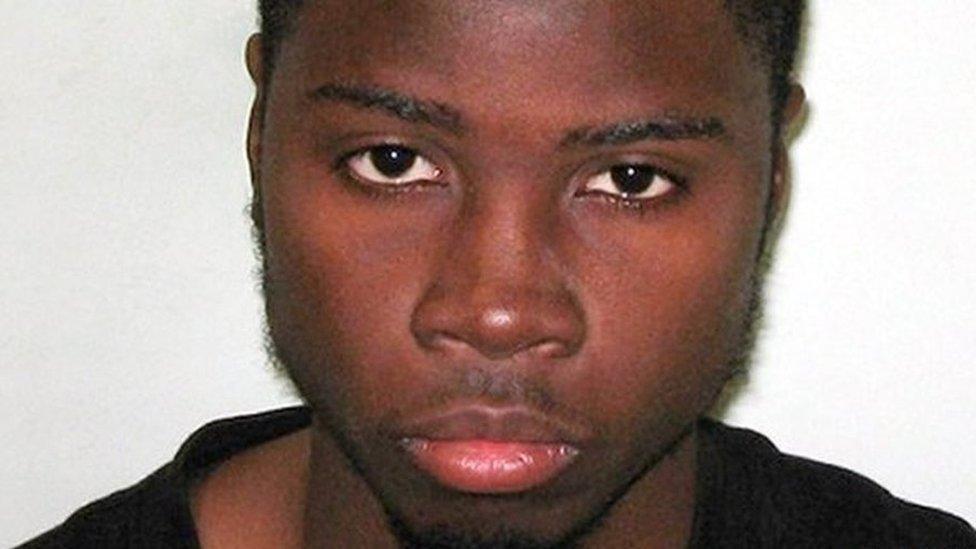Whitemoor prison terrorist attackers 'known to be dangerous'
- Published
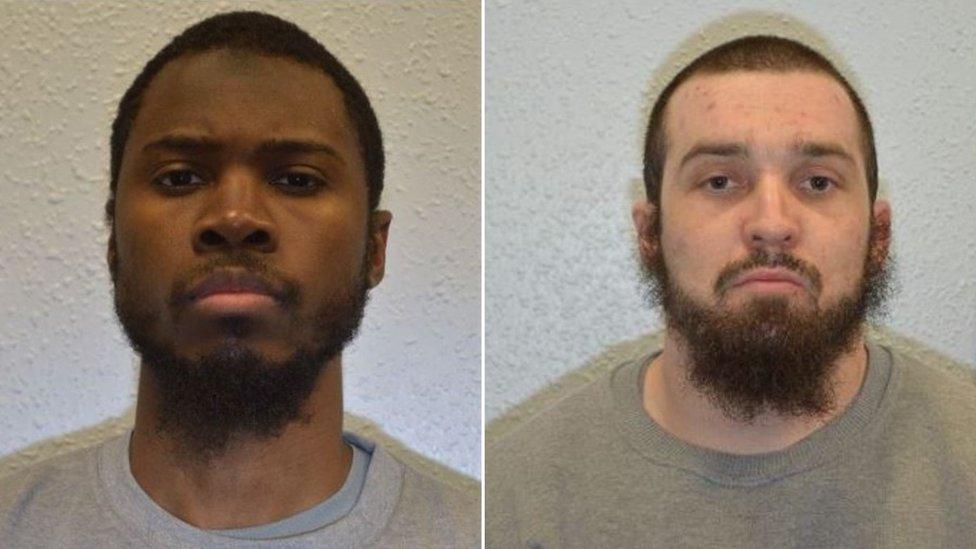
Brusthom Ziamani (left) and Baz Hockton have been convicted of attempted murder in high security Whitemoor prison
Two inmates have been convicted of attempting to murder a prison officer in a terror attack inside a maximum-security jail. Both were known to be dangerous and had been involved in violence in prison before.
When Brusthom Ziamani and Baz Hockton attacked Ian Trundle at HMP Whitemoor, Cambridgeshire, in January, the assault was the first terrorist attack to occur inside a British jail.
It was not a snap decision by the two men responsible.
They had planned it in advance, crafting makeshift weapons, fake suicide vests and a martyrdom letter.
It was not the first time either of the men had been involved in prison violence.
Convicted terrorist Ziamani, jailed in 2015 for planning to behead a British soldier, was took part in violent disorder with other extremist inmates at Whitemoor two years ago.
Hockton, his accomplice, attacked another inmate in April last year at a prison in Kent.
He was moved elsewhere, before eventualy arriving at Whitemoor.
Unprovoked attacks
After the most recent verdict, it can be reported that Hockton pleaded guilty earlier this year to the prisoner assault in Kent.
However, he was only charged after the Whitemoor attack.
Hockton was originally jailed for a series of assaults in Ramsgate in 2016, including a knife attack on a man with whom he had a minor argument and attacks on three separate victims in a single night.
At the time, police said it was "impossible to know" why he had "launched unprovoked attacks on random people".
Hockton, who converted to Islam in prison, had previously chronicled his hedonistic lifestyle on social media, stating that "getting high and money is ma motive", often posting images of himself drinking and using drugs.
Yet even in prison, he retained access to Facebook.
Weeks before the attempted murder, he uploaded a mobile phone image of himself boasting that he would be home soon.
His radicalisation took place in prison, mainly at Whitemoor, where he came into contact with and adopted the violent dogma associated with the Islamic State group.
A man with a history of unprovoked violence and knife attacks had found an ideology that encouraged such acts.
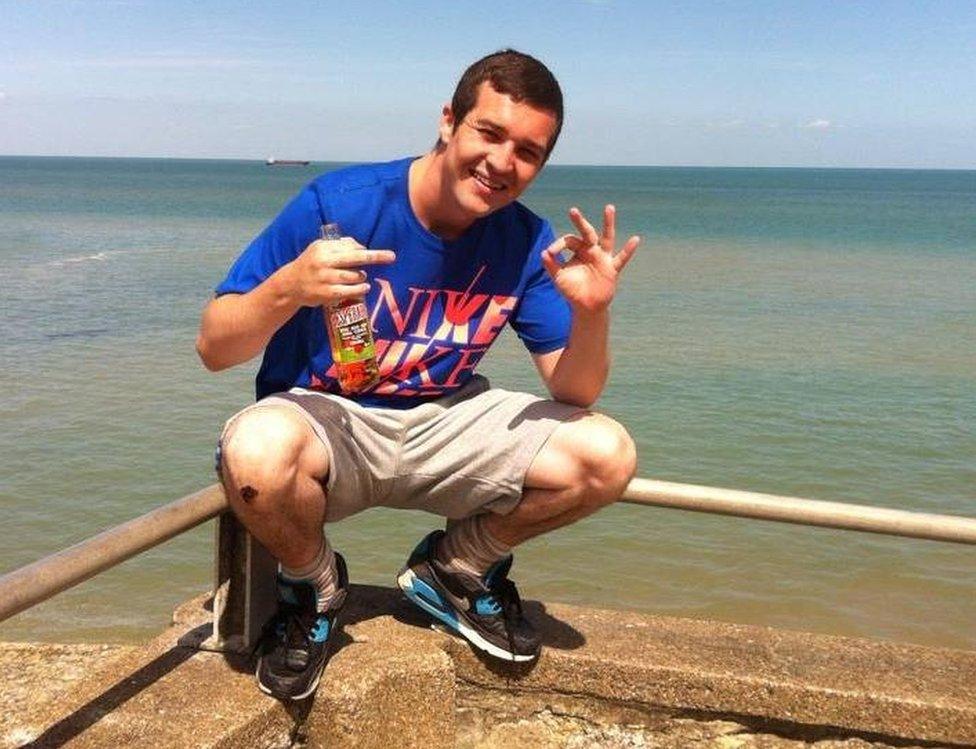
Before he was jailed, Baz Hockton would post pictures of himself drinking
He quickly fell under the influence of Ziamani, who instructed Hockton on what to think and believe.
An intelligence report created by a prison officer shortly before the attack noted the close association that had developed between the pair, who would meet at every opportunity.
Despite being a known radicaliser, Ziamani boasted in court of gaining access to a memory card containing extremist material, which he then transcribed for Hockton.
Howvever, Ziamani had received a certificate of achievement at Whitemoor and, on the morning of the attack, had been due to attend a painting and decorating workshop.
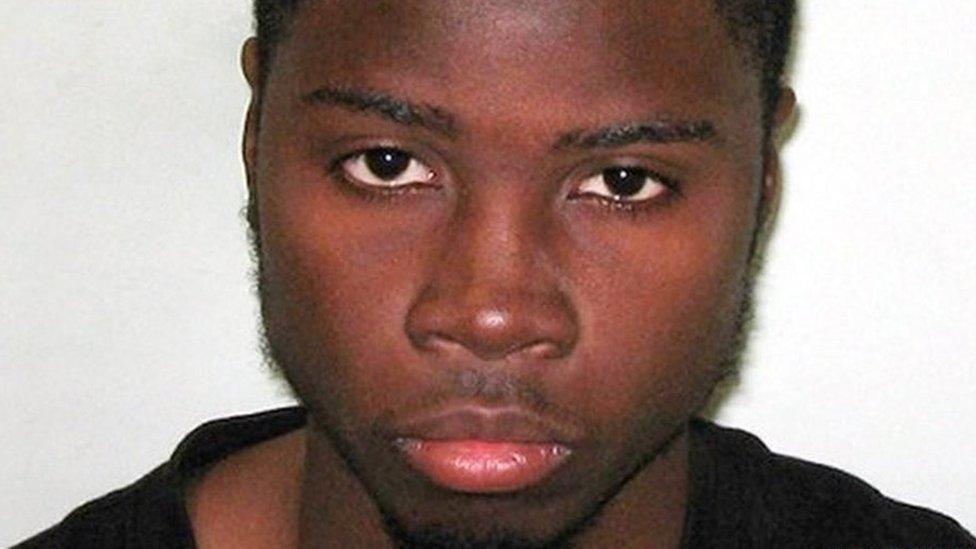
Brusthom Ziamani was jailed for planning a terrorist attack in 2014
As a teenager, Ziamani's own radicalisation had been rapid, after he began associating with Anjem Choudary and members of the banned group al-Muhajiroun.
Because they were Category B prisoners, Ziamani and Hockton only had their cells searched every three months.
Their attack was carefully planned and executed, using weapons they constructed themselves, such as lumps of twisted metal with fabric-covered grips and metal stabbing implements.
They at first sought to lure a female prison officer to a store cupboard on the pretext of getting them a spoon. She refused. Ziamani then asked an experienced officer called Neil Trundle, who agreed.
The CCTV footage of what unfolded next shows just how isolated he was, with the attackers pouncing on him from behind, stabbing at his head and neck as he fell to the ground.
The officer's resistance meant he was not forced into the store cupboard itself, where he would have been unable to cry out and have been in even greater danger.
When others arrived to help, the attackers ran towards them, with Ziamani punching the female officer and a nurse before returning to stab at Mr Trundle.
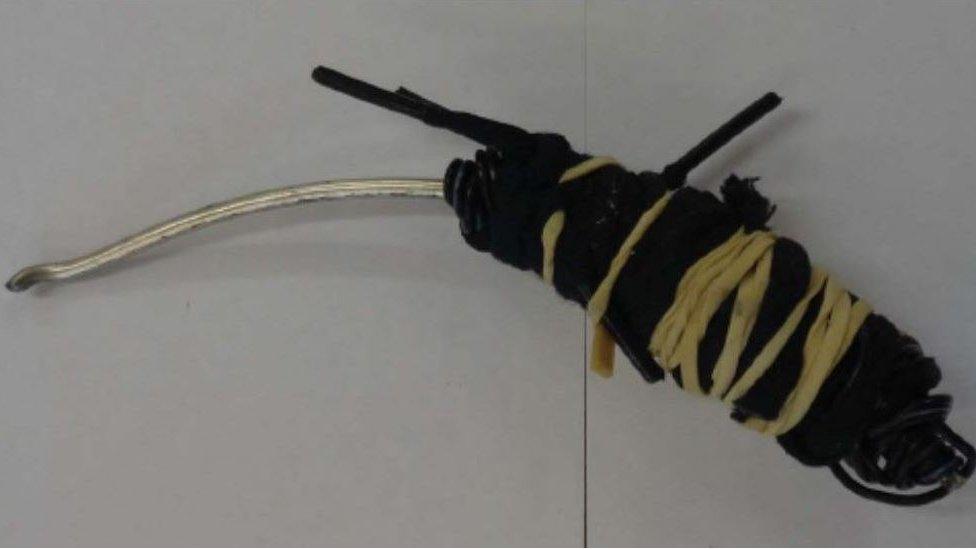
The two men made makeshift weapons before launching the attack
After that, multiple officers arrived and managed to restrain the men, amid shouts of "Allahu Akbar" - God is greatest - from the attackers and menacing references to their mock suicide vests.
When the men's cells were searched afterwards, writings supportive of Islamist extremism were recovered.
Ziamani had carried a letter during the attack, setting out his expectation of immediate martyrdom.
The attack on Mr Trundle happened just weeks after a former Whitemoor inmate killed two young people at Fishmongers Hall near London Bridge.
Steve Gillan, General Secretary of the Prison Officers Association, said the Ministry of Justice needed to "reflect and give prison staff the resources to eradicate such serious incidents".
"We need the resources and intelligence to deal with the radicalisation of some of the most dangerous offenders otherwise prison staff will continue to face these life-threatening assaults," he said.
'A wake-up call'
Prof Ian Acheson, a former prison governor and a senior adviser at the Counter Extremism Project, said he feared the murder of a prison officer by a terrorist was "creeping ever closer".
"The system of risk management and intervention with terrorist offenders that we have got inside prisons is not fit for purpose," he said.
"We need a fundamental review of how we manage the risk posed by, let's be clear, a very small number of prisoners in custody at the moment."
He said the case "should be a wake-up call", and there should be discussion about placing such prisoners "under proper surveillance, so they can't fashion suicide belts in one of the most surveilled and secure environments in the country".
Efforts should also be made to ensure "their toxic ideology is not just contained somehow but is actively challenged", Prof Acheson added.
The Ministry of Justice did not answer questions from the BBC about whether a review had been conducted into how a terrorist attack could have been planned and conducted in prison.
- Published1 October 2020

- Published23 September 2020

- Published22 September 2020
